- Home
- Fay Weldon
Moon Over Minneapolis
Moon Over Minneapolis Read online
Moon Over Minneapolis
Stories
Fay Weldon
Contents
STORIES OF WORKING LIFE
Subject to Diary
I Do What I Can and I Am What I Am
The Year of the Green Pudding
FOUR TALES FROM ABROAD
Ind Aff
A Visit from Johannesburg
Au Pair
How I Am is How You Are
TALES OF THE NEW AGE
Down the Clinical Disco
Pumpkin Pie
Sharon Loves Darren
STORIES FOR CHRISTMAS
Who Goes Where?
The Search for Mother Christmas
THREE TALES OF COUNTRY LIFE
A Move to the Country
Chew You Up and Spit You Out
The Day the World Came to Somerset
AS TOLD TO MISS JACOBS
A Gentle Tonic Effect
Moon Over Minneapolis
Un Crime Maternel
A Pattern of Cats
A Biography of Fay Weldon
STORIES OF WORKING LIFE
Subject to Diary
IF YOU DO NOTHING unexpected, nothing unexpected happens.
Oriole Green gave her name to the clinic receptionist, an unsmiling girl with dark skin and blonde hair and almost no eyebrows at all, who punched Oriole’s name up on the computer and then asked her if she’d been to the clinic before. Oriole said yes, without thinking, for she was under considerable stress, and the girl with no eyebrows punched some more buttons and then said flatly, ‘You’re lying. You haven’t.’
Oriole was on the eve of her fortieth birthday and for fifteen years had been spoken to, on the whole, and at least out of the bedroom, with politeness and respect. Though in the bedroom, she had noticed, men who were most—no, reverential was the wrong word, as was courteous; guarded was perhaps more accurate—were the ones who most wished to take her down a peg or so: called her names, slapped her around a little. Oriole didn’t mind: it was a relief. It was the price, she reckoned, a woman paid for being successful. Nothing was for nothing.
But this was not a bedroom. This was not a suitor, an impregnator, an erotic hit-and-runner, this was a chit of a fat-faced girl behind a desk in the Serena Clinic for Women, a double-fronted house in a dusty suburban garden where pregnancies were terminated for money, and such a girl, who was doubtless paid twice what her equivalent in the public sector would be, should not feel entitled to be rude to clients. The girl wore a pink name-tag on her white coat. It read ‘Daisy’. Daisy should smile and be friendly and helpful; and out of human kindness, what’s more, not merely in the interest of good public relations. Except, Oriole supposed, a girl in her early twenties who was not pregnant, who was not a supplicant for termination, would feel superior to her less fortunate sisters. Or perhaps, more likely, since the waiting list at the clinic was long, the problem was merely that no one had bothered properly to train the reception staff. Even in the private sector, termination came under the heading ‘seller’s market’.
‘I must have made a mistake,’ said Oriole, returning rudeness with courtesy, as one should. She had most certainly been to the Serena Clinic twice before, only, of course, as she would have remembered sooner had she not been under stress, using another name on each occasion. On her first visit, when she was 28, she had given her married name, and on the second, when she was 36, her boyfriend’s surname, out of some kind of rivalry, she now supposed, with his wife. At the time she had just felt better using his name, not her own. But now she had given the clinic her own original name, her school and professional name: as if finally she accepted responsibility, not for a child exactly, but at least for the non-event the child must of necessity be: and she felt less somehow hole-in-corner, in fact rather open and brave.
Even ‘child’ sounded wrong. A putative non-child perhaps: an alleged and accidental non-child. Of course this non-child, this growing cluster of cells, had in a way to be congratulated, inasmuch as, so successfully and so far, it had evaded all the powerful suggestions that it should not be, should not come into existence, egg and sperm by some miracle of happenstance colliding and joining, the two amongst millions not to succumb to the hazards set up by nature itself—a too acid, too alkali womb: a too early, too late arrival of the egg and/or delivery of the sperm: and so forth; oh, well done, well done! Not to mention the more considered incentives towards not-to-be: the contraceptive poisons, the rubber sheaths, the hormone-induced non-receptivity, the other many traps and fail-safe devices invented by humanity to stop itself breeding itself out of existence. What, survived all this? Still living? And then, once fertilized, to have clung on satisfactorily; to have successfully set the welcoming mechanism of the host body into vigorous motion—oh yes, you had to congratulate this cluster of dividing cells, even as your own surging hormones sickened you.
Well done, well done, you had to say, for having got so far! But also, so sorry, I do have to hit you on the head at this the last and greatest hurdle. I don’t want you. You can’t survive if I don’t want you. You got it right, but in the wrong body. A factor beyond your comprehension: one you were too tiny to comprehend, let alone forestall. That the whole great intended unit should notice you as you grew, and turn against you. For now that your scale has changed other forces must come into play. Pipped at the post, oh brave and courageous one, the one amongst millions. What was the month now? June? Left to itself it would be born in November.
‘Funny thing to make a mistake about,’ said Daisy uncheerily. She had a hairy upper lip, and had bleached the dark hairs, which was a mistake. Why didn’t she just tweeze them out? ‘Sit down,’ said fat-faced, greasy Daisy, as if Oriole’s standing was in itself a nuisance.
Oriole sat down. There was one other person in the waiting room, which was painted pale pink and had pictures on the walls of pretty ladies in crinolines, in silhouette. She was a thin girl with a white face and red-rimmed eyes, who lowered her eyes to her copy of House and Garden rather than meet Oriole’s. There was an article inside the magazine, Oriole knew, in the series ‘Successful Women’, featuring Oriole Green. Oriole had cut it out and pinned it on her kitchen wall. She was proud of it. The thin girl flicked past the page.
Oriole had been named for a bird, so her mother said: born to soar and fly. Of course you succeed, said her mother, proudly. Sometimes Oriole felt like a bird: she had a lean, small, muscly body covered by the finest designer feathers, a small beaky nose and bright sharp intelligent eyes, and a lot of reddish hair: she could feel herself sometimes hopping about: this appointment, that appointment, up those stairs, down that lift, pecking around, then soaring, soaring—
There was an uncomfortable silence in the waiting room. The thin girl snivelled, and lit up a cigarette.
Oriole took out her diary and looked through November. It was a busy month. Ex-King Alleyne of a minor Arab state had his book coming out: the Shrinks were making a come-back: there was the Head Office Conference in Reykjavik: all fourteen branches would be represented. She, Oriole Green, personnel manager, would be speaking. In December the company was going public. You had to prepare people for change, even if change was to their advantage people hated it; hers was to be the keynote speech. How could you fit in having a baby with all that, even if you wanted one, loved the father? Neither of which she did, not for lack of trying. How could you find a man to love; a man who was altogether admirable and superior to yourself, once you were past, say, thirty, and earning well? And you didn’t have babies by, marry or set up home with men you didn’t love. Did you? Others seemed to, it was true, but only women with no standards, no expectations, no subtlety.
Oriole couldn’t remember waiting like this, on pr
evious occasions. She’d been shown immediately to her room, undressed, settled down, been weighed up by the anaesthetist and gone straight into surgery. She felt obscurely that the wait was Daisy’s fault.
Oriole flicked through the current week. She had managed to adjust her appointments to keep not only this afternoon free but tomorrow morning as well. Body and mind might need a little time to recover, to adjust to a change in state. She reckoned to feel low for a week or so in any case. The sooner the operation was done the better. Hours counted. This particular hour was somehow dripping uncontrolled out of her life, thanks to Daisy.
The pale girl and her suitcase were taken away by a nurse whose name-tag said ‘Audrey’. Daisy and Audrey, the girls who worked at the clinic. Audrey smiled a great deal, showing broken teeth. Audrey’s smile was worse than Daisy’s unsmile. Were the Serena Clinic forward-looking, it would have had Audrey’s teeth capped. Or not employed her at all. The sense of things rotten or bad or missing in such a place as this surely had at all costs to be avoided.
‘Will it be long?’ Oriole asked Daisy, rashly. Daisy looked back at Oriole and thought unspeakable things or so it seemed to Oriole. Oriole was, quite determinedly, not looking her best. She wore no eye make-up. People went either way at funerals, she noticed. They either looked their best or their worst. ‘Enjoy it while you can,’ said Daisy.
Oriole had worn her best to her father’s funeral: her worst to her mother’s. She wondered why. She hadn’t grieved over-much when either of them died; she thought perhaps because she loved them, and so felt little guilt, and their deaths were after all timely. Her father had gone suddenly, through a stroke. Her mother lingered on in a kind of passive shock for less than a year, then had cancer of the liver diagnosed, and died promptly and painlessly almost of her own volition. They’d been in their seventies, and neither had enjoyed it. They were accustomed to being active, and were not so short-sighted they couldn’t see the litter on the floor, the bits of stick and wrappers that the dog chewed up, which they were now too stiff to bend to pick up; they had to wait for the daily help to arrive to see to it. Old age was no way to end a life. If you had a diary for a whole life, all the appointments would be crammed near the beginning: getting fewer and fewer as you flicked through, until the pages were all but empty.
Oriole felt tears in her eyes. She knew Daisy would misconstrue them. Daisy did. Daisy said, ‘Sometimes people change their minds—’ but she said it unpleasantly; judgementally, Oriole thought, she who had been named after a bird, to soar and sing and rejoice. The kind of women who end up in this waiting room of mine are feckless and hopeless, Daisy implied: the kind who change their minds and put me and my computer to endless trouble.
Oriole smiled coolly at Daisy and made no reply.
Oriole thought, well, this is really not time wasted. Thank you, Daisy. This is thinking time, reflective time. Everyone needs this quality time. In progressive businesses such spare time is built into timescales, just as free periods were when we were at school.
No doubt that particular free time was the result of timetabling inconsistencies and inadequacies. Never mind: we students, being ignorant, interpreted it as a gift, a kindness, from a benign authority and were the happier for it.
Seven weeks from her last period. She looked that up in her diary too. There was the little tick. Regular as clockwork; predictable as the moon. Was the moon predictable? She supposed so. The moon came and went, waxed and waned, without Oriole noticing. What was the point of noticing the moon, if the moon took no notice of you? ‘Oriole,’ her mother once said, ‘life is not all give and take, tit for tat: you do this and I’ll do that, watch my back and I’ll watch yours. Other factors intervene.’ But what? Love? Her mother loved her father and she, Oriole, had intervened by being born. And even love ended in death, in silence. In strokes and cancer of the liver.
So little time to think. Too tired to think when she got home: and for holidays she’d go to health hydros where she’d starve and exercise herself into somewhere between a stupor and a high. Too tired to talk. And who was there to talk to, even if you could formulate the right words to echo the bizarreness of your thoughts? By the time you’d said too often to too many friends, when they rang to suggest lunch, or an outing, or a holiday, ‘Just a moment, I’ll get out my diary,’ and then, ‘Sorry, I can’t make it,’ they’d lost patience, moved on, thought you valued something more than them. Which in a way you did, so you could hardly blame them. Men in business had wives to live their lives for them: remember birthdays, arrange dinners, have their children: Oriole only had herself. She’d been married once: but it hadn’t outlasted a year. He’d been an air-traffic controller: he knew exactly where not only he but everything and everyone else would be, ought to be, at a certain time: in the end the uncertainty of her hours, the sudden crises, the middle-of-the-night phone calls—some of her clients were Australians, and just didn’t seem to comprehend that their glorious midday was someone else’s exhausted two in the morning—had defeated him. ‘We’re heading for a crash,’ he’d said, panicky, and so of course they were. He wanted her to be at home when he was, waiting, coming into existence when he opened the front door, blanking out of it when he left. Well, of course, she wanted him to be the same. There when she wanted him: not when she didn’t. Francis, her husband.
She’d felt bad about failing to meet his demands, and confused by his expectations. She couldn’t concentrate, she’d quite forgotten to look in her diary. Francis had been the one to point out that she hadn’t bled for two months. She was three months gone by the time she got to the Serena Clinic. That had been really horrible. And when she got back four days later there were two significant messages on the answerphone: one on Monday asking her to be a fill-in speaker at the Toronto conference—and she knew her promotion depended upon it—and one on Wednesday from Francis saying he knew she would go to Toronto, not stay at home, and so he was going off himself. Where? Anywhere, just somewhere else, away from her. And so he had. Now he was married to a nice boring little stay-at-home and had two children. The elder one had been born with some disorder which made its head swell up with water—Oriole somehow felt it was her fault, though of course that was absurd. But she’d been upset. She’d loved him, this man who had the flying machines within his care and control—this dextrous male. If he’d given her time she could have broken the addiction, because that was what it was, an addiction to her diary. Subject to diary. The diary that kept you forgetful, so busy you were being reminded. Forgetful of what?
She couldn’t remember now why she’d felt obliged to get rid of the air controller’s baby. Some necessity, some need, some fear? Perhaps his. Or had she just been putting motherhood off to some more convenient time? If that had been the reason, she’d been wise enough. If she looked through past diaries it was clear there never had been, never would be, a convenient time.
Speaking the unspeakable. Daisy was punching up names and numbers on her computer. She could say to her, ‘Daisy’—such an advantage to the anonymous, the habit of putting name-tags on the humble—‘Daisy, why do you pluck out your eyebrows but leave your lip-hairs alone? Shouldn’t it be the other way round?’ But you couldn’t say that. Not just because Daisy could pull a string or two, make sure Oriole’s anaesthetic was too light, expose her to the risk of septicaemia and other foreseeable things as well—the humble had all kinds of amazing powers—but because it was not done to say things to people which would hurt in the short term though help in the long. A pity. She searched for something friendly and companionable to say to Daisy, but failed.
What could she say? ‘I am an important person; please treat me with courtesy’? No. Any woman with her legs apart and some tearing, rending instrument up inside her as she slapped nature in the face was pretty much of a muchness with the last one on the table, the next one to come.
‘You are here on the computer,’ said Daisy, ‘if Green’s your maiden name?’
‘Yes,’ said Oriole. Mai
den name. How sweet and naive it sounded. She wondered what kind of girl she’d been. How could one ever know: you could only see yourself from the inside out. She thought she probably hadn’t ever had much brain, only competence and a kind of soaring sensuality. So how had it gone wrong? Was it mood, a kind of generalized feeling tone, or nature, or just the chance events of a certain day which had led her to this point: forty, childless, unmarried. Not a bad point to be. Nothing wrong with being forty, or childless, or unmarried, except that spoken all together they sounded too final, too unwanted for comfort.
‘The first time you were here you let it go three months,’ observed Daisy, ‘and there were complications. Still, it hasn’t affected your fertility.’
‘Clearly not,’ said Oriole. The second time she’d been only six weeks’ pregnant: that was Hassan’s baby. She remembered well enough why she’d let that one go by. Hassan had been beautiful, beautiful, but married: he didn’t think, or reason, or plan: he couldn’t organize anything: he was a gardener: he loved all living, growing things except, it seemed, Oriole’s baby. She didn’t want to lose him so she’d lost the baby instead: she never even told him. She lost him anyway. He worked for the Parks Department, nine to five, and the complications of her unsocial hours and his getting away in secret from his wife had quite worn out the romance. Lovers looked silly in diaries: their initials softly pencilled in. ‘I will meet you, my darling, my darling, subject to diary!’ Men could do it: women couldn’t: that was the problem.
‘An expensive form of contraception, if you ask me,’ said Daisy.
‘I didn’t ask you,’ said Oriole.
She could see this was her last chance. But how did you have a baby by your PA and go on working in the same office with him? Stop work and live off what? With him? Off him? On his lower salary? He wouldn’t get much further up the ladder: she wrote his annual report: she knew it well enough. Oriole Green, a source of scandal and mirth! Oriole? Oh, Oriole the high-flyer: flew over a volcano, got her wings burned, plummeted, died. Babies got into your heart and twisted knives of guilt and obligation. Babies killed you: everything in you that wasn’t totally female, at any rate. That flourished, to the detriment of the whole.

 Trouble
Trouble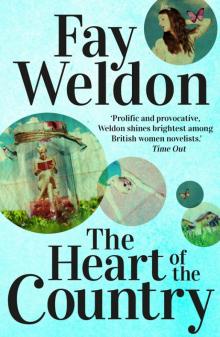 The Heart of the Country
The Heart of the Country Wicked Women
Wicked Women Mischief
Mischief Long Live the King
Long Live the King Remember Me
Remember Me Worst Fears
Worst Fears Chalcot Crescent
Chalcot Crescent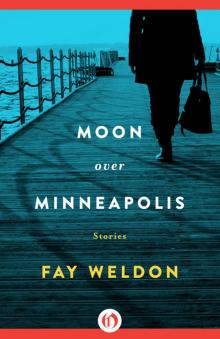 Moon Over Minneapolis
Moon Over Minneapolis The New Countess
The New Countess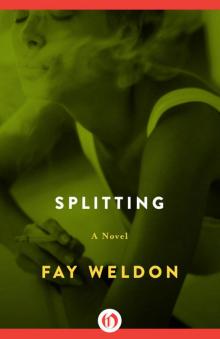 Splitting
Splitting After the Peace
After the Peace Habits of the House
Habits of the House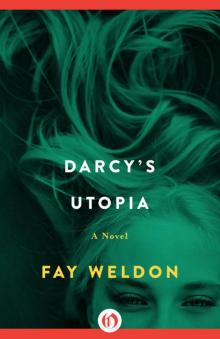 Darcy's Utopia
Darcy's Utopia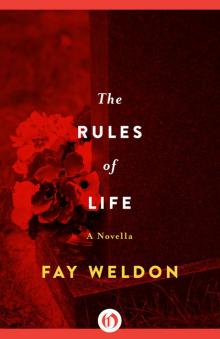 The Rules of Life
The Rules of Life Kehua!
Kehua! Before the War
Before the War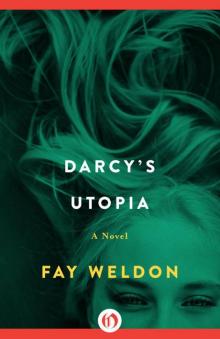 Darcy's Utopia: A Novel
Darcy's Utopia: A Novel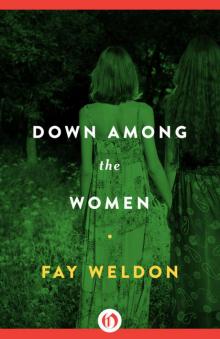 Down Among the Women
Down Among the Women Letters to Alice
Letters to Alice 3 Great Historical Novels
3 Great Historical Novels Female Friends
Female Friends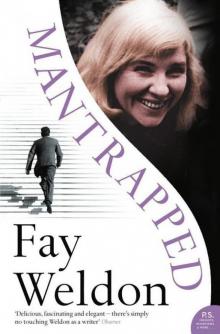 Mantrapped
Mantrapped The Bulgari Connection
The Bulgari Connection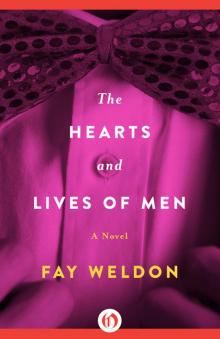 The Hearts and Lives of Men
The Hearts and Lives of Men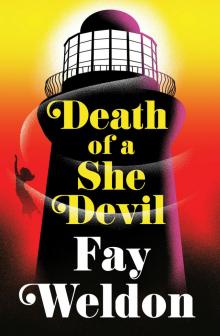 Death of a She Devil
Death of a She Devil